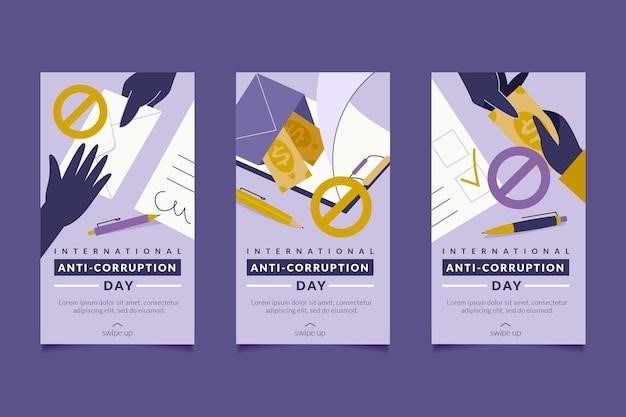In-School Suspension⁚ An Overview
In-school suspension (ISS) is a disciplinary measure where students are temporarily removed from regular classes but remain within the school environment. It serves as an alternative to out-of-school suspension, aiming to address behavioral issues while maintaining educational engagement. ISS policies vary across schools and districts, often outlined in detailed rulebooks or conduct codes.
Defining In-School Suspension (ISS)
In-school suspension (ISS) is a disciplinary action involving the temporary removal of a student from their regular classes and typical school activities. Unlike out-of-school suspension, ISS keeps students within the school building, often in a designated area supervised by school staff. The purpose is to provide a structured setting for reflection and behavior modification while minimizing disruption to the student’s education. ISS may involve completing assigned work, participating in counseling or restorative justice programs, or engaging in other structured activities. The duration of ISS varies depending on the severity of the infraction and school policy, ranging from a single day to multiple days. Detailed rules regarding eligibility, duration, and procedures are typically outlined in school handbooks or separate ISS policy documents, readily available in PDF format for easy access and review by students, parents, and staff. These documents often include information about the appeals process should a student or parent disagree with the disciplinary action.
Purpose and Goals of ISS Programs
In-school suspension (ISS) programs primarily aim to address student behavioral issues while minimizing the negative consequences associated with removal from the regular learning environment. A key goal is to provide a structured environment that promotes reflection and behavior change, allowing students to understand the impact of their actions and develop strategies for improved conduct. ISS offers an opportunity for individualized intervention, potentially including counseling, conflict resolution training, or academic support. The hope is to deter future misbehavior through a combination of consequences and rehabilitative strategies. By keeping students within the school setting, ISS also strives to maintain educational continuity, minimizing academic setbacks that can occur with out-of-school suspension. Effective ISS programs frequently incorporate restorative justice practices, focusing on repairing harm caused by inappropriate behavior and promoting reconciliation within the school community. Careful documentation of student behavior, interventions, and progress is crucial for evaluating the effectiveness of the ISS program and making necessary adjustments to improve its impact on student behavior and academic performance.
Legal Aspects of In-School Suspension
The legal framework surrounding in-school suspension (ISS) is multifaceted and varies across jurisdictions. Schools must adhere to federal and state laws regarding student rights, including due process protections. Before imposing ISS, students are typically entitled to notice of the alleged infraction, an opportunity to respond, and a fair hearing process. The severity of the infraction and the student’s age influence the level of due process required. While ISS is generally considered a less severe disciplinary action than out-of-school suspension, it’s crucial for schools to ensure their policies and procedures comply with legal mandates to avoid potential legal challenges. Discrimination based on race, gender, or disability in applying ISS is prohibited by federal law. Documentation of the entire disciplinary process, including the infraction, the hearing, and the decision, is essential for transparency and legal defensibility. Schools should regularly review their ISS policies to ensure they remain current with legal requirements and best practices, consulting with legal counsel if needed to ensure compliance. Failure to provide adequate due process can lead to legal action and potential liability for the school district.

ISS Policies and Procedures
Comprehensive in-school suspension (ISS) policies and procedures are crucial for maintaining order and fairness. These policies should clearly define offenses warranting ISS, the process for issuing suspensions, and students’ rights during the suspension. They must also outline the structure and supervision of the ISS setting itself.
Developing Effective ISS Policies
Crafting effective in-school suspension (ISS) policies requires careful consideration of various factors to ensure fairness, consistency, and positive outcomes. These policies must clearly define the range of student behaviors that trigger ISS placement, differentiating between minor infractions and more serious offenses requiring stricter measures. The process for determining ISS placement should be clearly outlined, emphasizing due process rights, including the opportunity for students to present their side of the story before a decision is made. The policies should also specify the duration of ISS assignments, considering the severity of the infraction and the student’s past disciplinary record. A well-structured ISS program includes a clearly defined set of rules and expectations for student conduct within the ISS setting. These rules should focus on promoting a positive learning environment despite the disciplinary context, emphasizing the importance of respectful behavior, cooperation, and engagement in assigned activities. Regular review and updates are essential to ensure that ISS policies remain relevant and effective, reflecting changes in school climate, student demographics, and best practices in student discipline.
Due Process Rights of Students
Students facing in-school suspension (ISS) are entitled to fundamental due process rights, ensuring fairness and equity throughout the disciplinary process. These rights typically encompass the right to receive written notification of the alleged infraction, specifying the date, time, location, and nature of the violation. Students should also have the opportunity to respond to the allegations against them, presenting their version of events and offering any relevant evidence to support their case. This often involves a meeting with school officials, where they can explain their actions and challenge the accusations. Before imposing ISS, school authorities must provide students with a fair and impartial hearing, ensuring they are treated with respect and dignity throughout the process. The school’s decision to impose ISS should be based on substantial evidence, avoiding arbitrary or capricious actions. A formal record of the disciplinary proceedings, including the allegations, student response, and the final decision, should be maintained for transparency and accountability. The right to appeal the decision is often granted, allowing students to seek review from higher authorities within the school system if they believe the process was unfair or the punishment excessive.
Notification and Documentation Procedures
Effective in-school suspension (ISS) policies necessitate clear and consistent notification and documentation procedures. When a student is to receive ISS, formal written notification should be promptly provided to both the student and their parents or guardians. This notification must clearly state the reason for the suspension, citing the specific rule or policy violated, the duration of the ISS, and the date(s) the student will be required to serve the suspension. Crucially, the notification should outline the student’s rights during the ISS period, including the right to contact their parents or guardians, access to educational materials, and any opportunities for appeal. Comprehensive documentation is vital, including detailed records of the incident that led to the suspension. This documentation should be objective and factual, avoiding subjective opinions or biased interpretations. The documentation should also include any statements made by the student, witnesses, or school staff involved, along with any evidence supporting the claims. Maintaining thorough records ensures transparency and allows for proper review should appeals or disputes arise. These documents form a crucial part of the school’s administrative record and can be vital in defending the school’s actions if legal challenges occur. Finally, a formal confirmation that the student served their ISS should be included in their file.

Effectiveness and Best Practices
Research consistently highlights the need for effective in-school suspension (ISS) programs. Best practices emphasize restorative justice approaches and focus on supporting student learning, not just punishment. Alternative disciplinary strategies are crucial for improved outcomes.
Research on ISS Effectiveness
Studies on the effectiveness of in-school suspension (ISS) programs reveal mixed results. Some research suggests that ISS can be an effective disciplinary tool when implemented correctly, particularly when coupled with restorative justice practices and behavioral interventions. These studies often show that ISS, when combined with support systems and structured learning environments, can reduce negative behavioral patterns and improve school climate. However, other research indicates that ISS may not significantly improve student behavior or academic performance, and in some cases, may even exacerbate existing problems. These studies often highlight the need for clear guidelines for ISS implementation, including ensuring that the program adheres to due process rights and involves consistent and fair application of consequences. The effectiveness of ISS is highly dependent on the specific program design, implementation, and the overall school climate. Therefore, it’s crucial to carefully consider these factors before adopting or modifying an ISS program. Further research is needed to fully understand the complex relationship between ISS practices and long-term student outcomes.
Best Practices for ISS Implementation
Effective in-school suspension (ISS) programs require careful planning and execution. Establishing clear and consistently applied rules is paramount. These rules should be detailed in a readily accessible student and parent handbook. The ISS environment should be structured and supervised, offering educational opportunities to minimize academic disruption. A focus on restorative justice practices, such as conflict resolution and mediation, can promote positive behavioral change. Regular communication between school staff, parents, and students is vital to ensure accountability and support. The duration of ISS should be proportionate to the infraction, and regular review of the program’s effectiveness is necessary. Data collection on student behavior before, during, and after ISS is crucial for evaluating the program’s impact. Collaboration with mental health professionals can provide valuable insights into student needs and inform intervention strategies. Offering alternative disciplinary approaches, like restorative circles or conflict resolution training, can prevent repeated ISS referrals. Finally, ensuring equity and fairness in applying ISS rules is critical to avoid disproportionate impact on specific student groups.
Alternative Disciplinary Approaches
Moving beyond traditional punitive measures like in-school suspension (ISS), many schools are adopting alternative disciplinary strategies. Restorative justice practices, focusing on repairing harm caused by misbehavior, are gaining popularity. These approaches involve collaborative circles where students, teachers, and parents discuss the incident and work towards solutions. Mediation and conflict resolution programs equip students with skills to manage disagreements peacefully. Positive behavior interventions and supports (PBIS) focus on proactively teaching positive behaviors and reinforcing them consistently. Social-emotional learning (SEL) programs help students develop self-awareness, empathy, and conflict resolution skills, reducing the likelihood of disciplinary issues. Community service projects can offer students a chance to make amends and contribute positively to their school community. Mentoring programs pairing students with positive adult role models can provide additional support and guidance. Parent-teacher conferences, involving open communication and collaborative problem-solving, can address underlying issues contributing to misbehavior. Early intervention strategies identify students at risk of disciplinary problems, offering support before serious issues arise. By implementing these diverse approaches, schools can create a more supportive and inclusive learning environment, ultimately reducing reliance on punitive measures like ISS.
